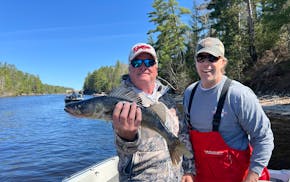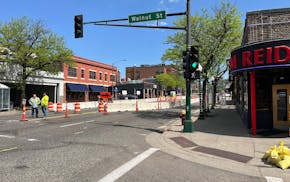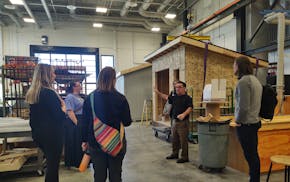VATICAN CITY - Hours before the cardinals, chanting in procession, entered the Sistine Chapel on Wednesday for the start of the conclave, a telling aside occurred inside St. Peter's Basilica. A senior cardinal, seen on camera, offered "good luck" — twice — to the man widely seen as the front-runner to be next pope: the Italian prelate Pietro Parolin.
But when the white smoke finally appeared Thursday after the fourth vote, it was not Parolin who greeted crowds from the balcony. A cross section of cardinals had coalesced around another, historic choice: Chicago native Robert Prevost, a close ally of Pope Francis who took the name Pope Leo XIV, the first American pontiff.
Cardinal Robert Walter McElroy, the archbishop of Washington, said Prevost's breakthrough occurred Thursday, the day of his selection: "There was a great movement on the second day, a great movement."
Yet as early as the initial vote Wednesday, Prevost was already over-performing, according to one senior Vatican official — in part because the prelate had always been a stronger candidate than many outside the Vatican generally understood. The official spoke on the condition of anonymity to discuss a secret vote.
An American who had become a naturalized citizen of Peru while serving the church on the country's northwest coast, Leo emerged as an early favorite among an influential group that included a cluster of Latin American cardinals, particularly those who sought a continuation of Francis's legacy.
"Prevost, unknown to the many, was favored by a majority of the cardinals that came from abroad — he wasn't unknown to them," the official said.
Even before the conclave began, Prevost was viewed by many in the Vatican as a logical successor to Francis despite being from the United States — a nation the Holy See had long seen as having outsize global power and influence. Francis had plucked him from his distant outpost in Peru in 2023 to run the influential dicastery, or ministry, of bishops. In no time, he'd become indispensable to the pope's bid to change the church by elevating clerics seen as more in line with Francis's pastoral approach, emphasis on the poor and open door.
In the important congregations — assemblies of cardinals ahead of the vote — Prevost had not necessarily overwhelmed the cardinals with inspiring words, the way Francis had in 2013 when he spoke stirringly of ministry to the world's "peripheries." Rather, he had a gentle, engaging manner and, as Francis liked to say, "the smell of the sheep" on him from serving the church for decades in the proverbial trenches.
"I don't remember any particular intervention Prevost offered to the general congregation. But he did engage quite effectively in smaller group conversations," Cardinal Wilton Daniel Gregory, another Chicago native and the retired cardinal of Washington, said at a news conference in Rome on Friday.
"I did talk to Prevost and we talked about Chicago, of course. It wasn't that he stood up and made this speech that wowed that body," he said.
Perhaps most shockingly, the taboo of electing an American appeared to be more myth than reality. It simply wasn't a major topic of discussion, several cardinals said.
"I think the impact of him being an American was almost negligible in the deliberations of the conclave, surprisingly so for me," McElroy said at the news conference. "I'm a newer cardinal and I talked to many of those who are from different places … and what surprised me was the real absence of that being a key question at all in this conclave."
In many ways, Prevost, given his extended years in Peru, was simply not viewed as an American.
"Robert Prevost was a missionary bishop who gave himself fully to his people and who played an important role in the church of his new country, Peru. In fact, he became a Peruvian citizen," Canadian Cardinal Michael Czerny, who studied in Chicago, said in an interview Friday.
The support of cardinals from the Global South "must have played a key part in providing Prevost's wide consensus," said longtime Vatican watcher Marco Politi. "This conclave saw … the rise of a moderate church, seeking a balance, unity, harmony, a well-oiled curia, a collegial pope," he added, referring to the Vatican bureaucracy.
Leo is widely seen by the cardinals as continuing Francis's emphasis on migrants rights — an issue he is said to care passionately about. However, cardinals pushed back at the notion that an American had been elevated to the papacy as a response the Trump White House.
"I didn't sense in the congregations with other cardinals of the world that the conclave was an extension of the U.S. political election," Gregory said. "What cardinals were concerned about primarily was: Who among us can bring us together?"
Parolin, in contrast, appeared to lack some fundamentals for being pope. Though a skilled longtime diplomat, he had never served as a pastor, and some cardinals worried about his ability to connect with the global flock. At a Mass for 200,000 young Catholics a day after Francis's funeral, for instance, Parolin had dutifully read his homily off a script rather than seek to electrify the crowd.
"He was maybe hindered by his excessive insistence" of wanting the job, the senior Vatican official said.
In contrast, once Leo's nationality was overlooked, the internationalist cleric and longtime missionary who is fluent is several languages seemed to tick all the boxes.
"He's a triple threat with languages. He was a missionary pastor. I think they wanted a pastor, somebody who had been a pastor," Chicago Cardinal Blase Joseph Cupich said in an interview with the Washington Post.
There was another big reason for the conclave to lean toward Prevost.
The Vatican is in financial crisis, suffering from a drop in global donations and a gaping deficit in its pension fund. The shortfalls had led Francis to clash with the heads of Holy See dicasteries over budget cuts shortly before his February hospitalization with double pneumonia, according to two Vatican officials familiar with the situation.
Two cardinals who spoke with the Post on Friday said that Leo, when he served as head of the bishop's dicastery, and earlier, as the head of his Augustinian order, was seen as a sharp manager — the kind of detail man the Vatican needs.
"I think that the issue of the financial sustainability in the Holy See was on the minds of people," Cupich said. Prevost was "smart enough to be able to get the right people who can help."
Another factor was theological convergence. Despite a comment by Leo at a Vatican assembly in 2012 that seemed to disparage homosexuals — a position some LGBTQ+ Catholics say they hope he has "evolved" on after being close to Francis — the new pope was seen by the late pope's strongest backers as an heir to Francis's "open door" legacy.
He is "Francis, you might say, in a new form," Czerny said. "I have a strong feeling of Francis's legacy continuing in Pope Leo."
Though it is unclear how many of them voted in the conclave — cardinals swear an oath of secrecy — some staunch traditionalists and sharp Francis critics also seemed to coalesce around Leo on Friday, viewing him as a figure who is seen by some as perhaps more conservative than the late pope. As cardinal, Leo questioned the wisdom of ordaining female deacons, and on Friday, he used the platform of his first Mass as pope to highlight his mission as an evangelizer of the faith.
"I think in the end, a great majority was convinced of Cardinal Prevost," said Cardinal Gerhard Ludwig Müller, a German prelate and critic of Francis. "I think everybody now is content."
Michelle Boorstein contributed to this report.

Dennis Anderson: Crane Lake gives up its walleyes — and its memories

High school senior killed in collision with dump truck at Minnesota intersection

Sinkhole closes part of W. 7th near downtown St. Paul, and officials say repairing the 35-foot deep hole could take months

Neil the Polar Bear isn't sick. He's just getting old, Como Zoo says in TikTok video debunking claims
